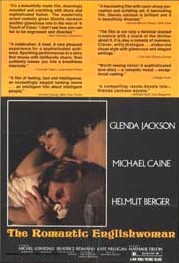
Women are an occupied country. Elizabeth (Glenda Jackson) is the bored wife of a successful English pulp writer Lewis Fielding (Michael Caine) who is currently suffering from writer’s block. She leaves him and their son David (Marcus Richardson) and runs away to the German spa town of Baden-Baden. There she meets Thomas (Helmut Berger), who claims to be a poet but who is actually a petty thief, conman, drug courier and gigolo. Though the two are briefly attracted to each other, she returns home. He, hunted by gangsters headed by Swan (Mich[a]el Lonsdale) for a drug consignment he has lost, follows her to England. Lewis, highly suspicious of his wife, invites the young man to stay with them and act as his secretary. Lewis embarks on writing a screenplay for German film producer Herman (Rene Kolldehoff) – a penetrating psychological story about The New Woman. Initially resenting the presence of the handsome stranger now installed in their home as her husband’s amanuensis and carrying on with the nanny Isabel (Béatrice Romand), Elizabeth starts an affair with him and the two run away with no money to Monaco and the South of France. Lewis follows them, while he in turn is followed by the gangsters looking for Thomas… It’s about this ungrateful woman who is married to this man of great charm, brilliance, and integrity. She thinks he won’t let her be herself, and she feels stuck in a straitjacket when she ought to be out and about and taking the waters and finding herself. With a cast like that, this had me at Hello. Director Joseph Losey’s customarily cool eye is lent a glint in Tom Stoppard’s adaptation of Thomas Wiseman’s novel (with the screenplay co-written by the author) in a work that teeters on the edges of satire. A house bristling with tension is meat and drink to both Stoppard and Losey, whose best films concern the malign effects of an interloper introducing instability into a home. It’s engineered to produce some uncanny results – as it appears that Lewis the novelist is capable of real-life plotting and we are left wondering if Elizabeth’s affair has occurred at all or whether it might be him working out a story. Perhaps it’s his jealous fantasy or it might be his elaborate fictionalising of reality: these interludes of adultery occur when he’s at the typewriter. Invariably there are resonances of Alain Resnais’ Last Year at Marienbad but it’s far funnier. Like that film, it’s something of an intellectual game with a mystery at its centre. Aren’t you sick of these foreign films? Viewed as a pure exploration of writerly paranoia as well as the marital comedy intended by the novel, it’s a hall of mirrors exercise also reminiscent of another instance of the era’s art house modernism, The French Lieutenant’s Woman. The flashback/fantasy elevator sequence that is Lewis’ might also belong to Elizabeth. You might enjoy the moment when Thomas mistakes Lewis for the other Fielding (Henry) but he still hangs in there without embarrassment and seduces all around him. Or when Lewis suggests to his producer that he make a thriller rather than the more subtle study he’s suggesting – and then you realise that’s what this British-French co-production becomes. It’s richly ironic – Lewis and Elizabeth have such a vigorously happy marriage a neighbour (Tom Chatto) interrupts a bout of al fresco lovemaking but none of them seems remotely surprised, as if this is a regular occurrence. And any film that has Lonsdale introduce himself as the Irish Minister for Sport has a sense of humour. And there’s the matter of the German producer who bears a passing resemblance to Losey and Berger’s accomplice who fleetingly reminds us of Luchino Visconti, Berger’s mentor and lover for much of the Seventies. If it seems inconsistent there is compensation in the beauty of the performances (particularly Jackson’s, which is charming, warm and funny – All she wanted was everything!) and the gorgeous settings, with a very fine score by Richard Hartley. The elegance, precision and self-referentiality make this a must for Losey fans. It was probably a tricky shoot – Jackson and Berger couldn’t stand each other, allegedly. And Caine placed a bet that he could make the director smile by the end of the shoot. He lost. Wiseman commemorated his experience with Losey in his novel Genius Jack. It’s not kind. This, however, is a sly treat you don’t want to miss. You are a novelist, an imaginer of fiction.